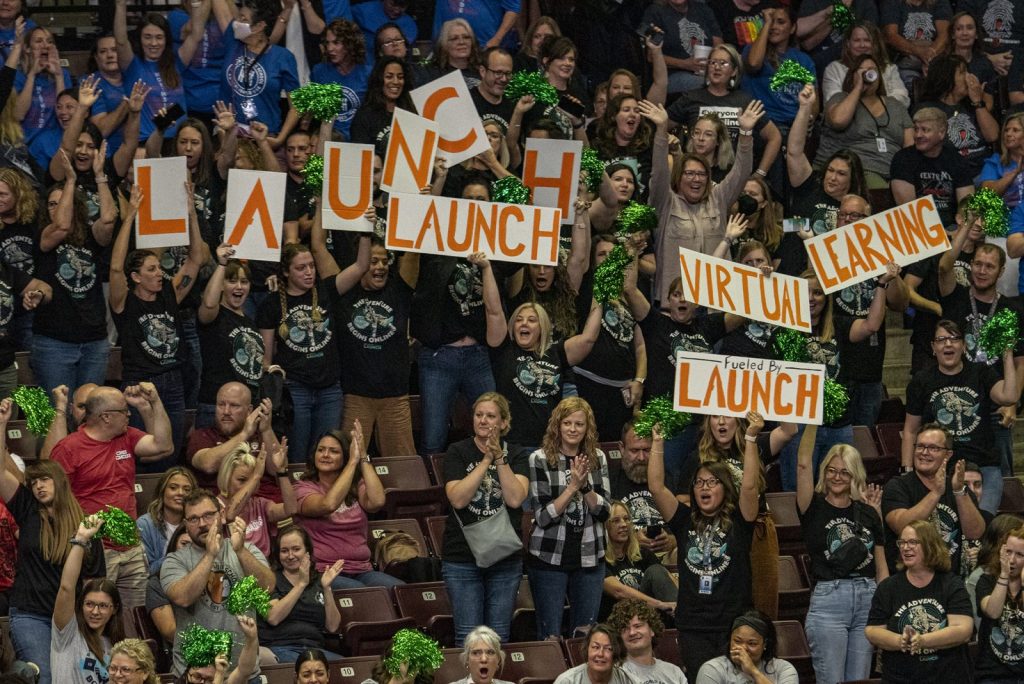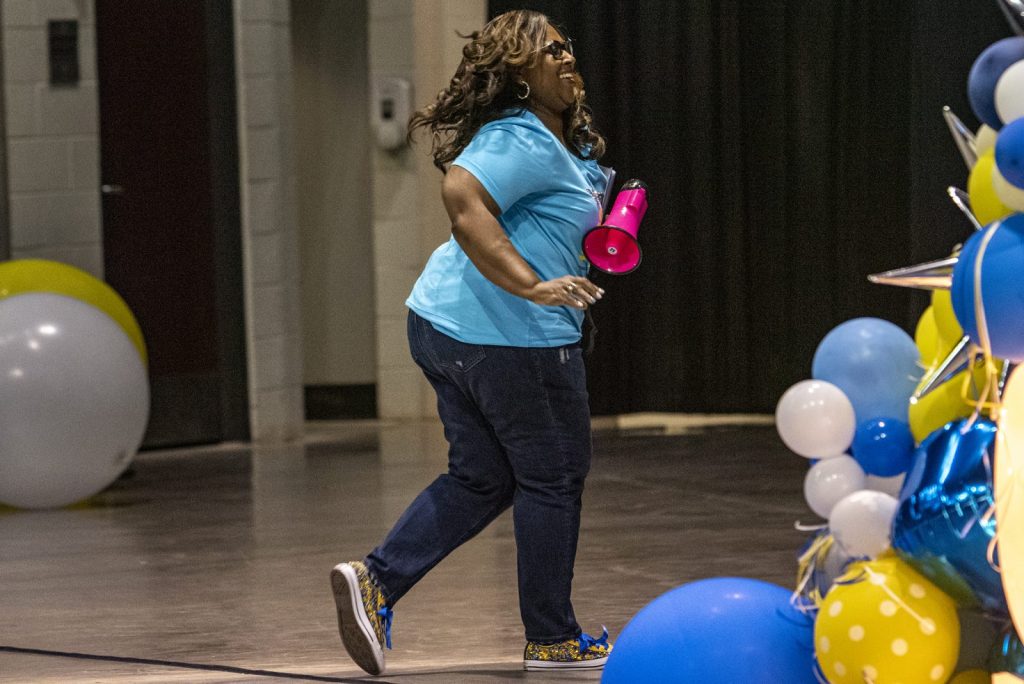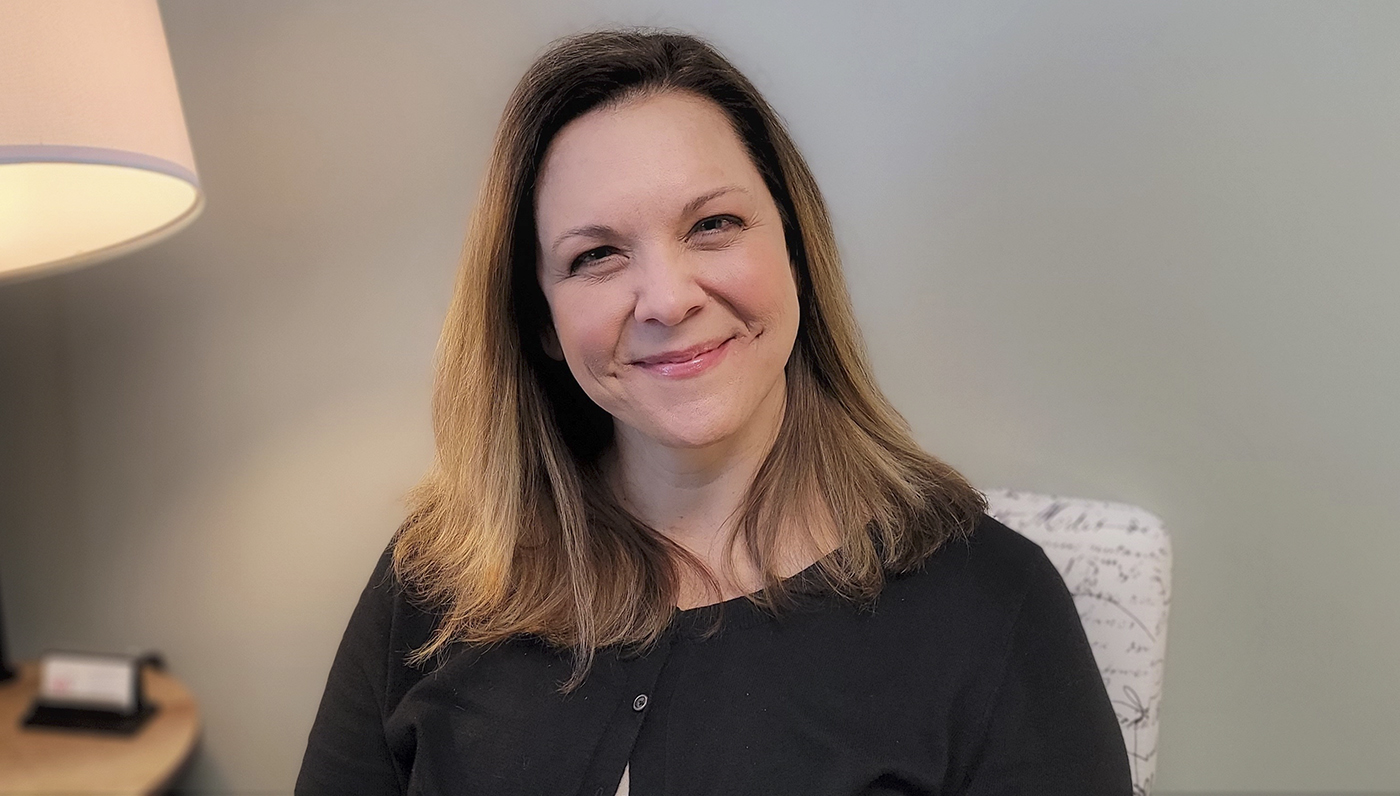A spirited back-to-school rally for Springfield Public Schools in August emphasizing teamwork between administrators and teachers has given way to a growing rift and a breakdown in communication.
At the heart of the conflict: a decision by Superintendent of Schools Grenita Lathan to halt monthly meetings with the leader of the teachers union. Instead, those meetings have now been delegated to the district’s human resources officer, a move that has upset union leadership.
During the Oct. 25 Springfield Public Schools board meeting, Laura Mullins, the head of the district’s largest teachers union, stood before the board, the superintendent, administrators and audience members and described the increasing tension between educators and district leaders.

“At the Aug. 16 staff rally, employees felt a surge of excitement as they started the school year being told they were all important parts of the SPS team,” Mullins, president of the Springfield National Education Association, said at the start of her allotted three minutes of public comment time. “Unfortunately, this has not been their experience.”
Teachers aren’t being trusted as instructional experts, she said, and are instead being told to follow time-consuming directives. She pointed to district-specified lesson planning steps, saying teachers weren’t receiving additional time to accomplish the requirements. Teachers’ plates are overflowing, she said, and they’re completing work on their own time, “a direct cause of employee burnout.” The SPS team, she said, “is riddled with mistrust and overpowering management.”
The district, in a statement given to the Hauxeda this week, disputed these characterizations. But at the meeting, Mullins comments were leveled unchallenged. Signing up for a public comment allows a speaker to talk for up to three uninterrupted minutes before sitting down, and there’s no dialogue on any of the issues brought up after time concludes.
Mullins public comments in October echoed several she’d made during the prior month’s board meeting. But there was a difference, Mullins said, in the steps she took before approaching the podium last month.

Up until October, Mullins had been meeting monthly with Superintendent Lathan and other top administrators to discuss a range of issues behind closed doors. That has changed.
This month, Mullins wrote in a newsletter to SNEA members that she and Lathan were no longer meeting.
“I know it's not my choice,” Mullins told the Daily Citizen. “This is Dr. Lathan's choice to not come to the meetings.”
Mullins will continue to meet with a high-level SPS administrator. Bill Redinger, the district’s new chief human resources officer, met with her last month and will do so in the future. District spokesman Stephen Hall said in a statement this represents a return to protocol now that Redinger is on board. Mullins said Redinger brings a wealth of HR expertise to the table, but would prefer Lathan and other high-level administrators join them there.
“The problem with meeting with just the chief of HR is he has no knowledge of what’s going on with academics, which happens to be where we have a massive amount of concerns,” Mullins said.
To her SNEA members, Mullins wrote:
“Although I know he will listen to our concerns, his ability to make the changes that are necessary is limited. Furthermore, I feel that is the responsibility of the superintendent to hear the concerns directly.
“Because of these worrisome developments, I will be making regular public comments at the BOE meetings to ensure your concerns are still heard by her, the upper admin, and the BOE.”
District challenges union leaders recent statements
The district, in a statement to the Daily Citizen, challenged Mullins’ recent characterization of the relationship breakdown between teachers and management.
“Our district remains unified in a shared commitment to help all children achieve their full potential,” Stephan Hall, SPS spokesman, said in a statement. “We can and we must do better. Recent statements from the Springfield NEA President during public board meetings, to representatives of the media, and to individuals throughout the district, do not accurately reflect the intentions, expectations or actions of the district’s administration. We are deeply disappointed and perplexed by the recent misrepresentation of facts. We do not believe that this false narrative represents Team SPS. In fact, it ultimately undermines the district’s ability to achieve academic progress on behalf of all the children we are privileged to serve.”
In response to the district statement, Mullins said she agreed that everyone at SPS wants what is best for student achievement, but challenged the assertion that what she has recently described in board comments and interviews is a false narrative.
“These are real experiences and valid concerns from staff,” Mullins said. “I don't see how that is false or a created narrative. It's facts of what's happening in our districts. The best interest of our kids is the center of everything that teachers do. We're not trying to undermine. We're trying to make it better for our students.”

District says new meeting structure a return to normal, while union head sees it differently
Both Mullins and Lathan are early in their leadership tenures in Springfield. Mullins, a longtime SPS teacher now at Pershing K-8, was elected to her first two-year term as union president in the summer of 2021. Lathan’s start date was July 1, 2021.
Before Lathan arrived, Penny Rector, the district’s former chief human resources officer, had most recently led regular closed-door meetings with the SNEA president. But Lathan agreed to meet with Mullins to build a collaborative working relationship and to prepare for Rector’s impending December 2021 retirement, according to a district statement.
Along with Lathan, Mullins said she met with the superintendent of academics, Nicole Holt, and the acting head of HR, deputy superintendent John Mulford. The closed-door meetings were favored by Mullins, who said that last year she turned down an offer of a standing slot on the school board agenda. Mullins said the meetings were set up at the behest of former SPS board president Alina Lehnert. She said Lehnert told her it was important for the union and the superintendent to have good communication.
“And I’d say from the beginning, there has been more tension than not in the meetings,” Mullins said. “And they haven’t really gone smoothly. And I guess I attributed that to everyone kind of finding their place in our new system, with all the players being new.”
Mullins said her goal in the meetings was to be a proactive voice for SNEA members, to let administrators know what they need and to also convey the new administration’s goals to members.
“If they wanted to do something, I felt like my role would have been best served in providing feedback before it goes out, or how to best roll it out or how to best approach the teachers with it just because I've been here since the ‘90s,” Mullins said. “And I know what they've been through. So I wanted to be a bridge between her changes, and how she was perceived by employees. That's what I wanted it to be. And never did get there.”
But when they were meeting, Mullins said she promised Lathan she would first address any issues her members had in private with her to see if they could be resolved or explained before speaking publicly about them.
After being informed of the change in meeting structure, Mullins said she asked SPS board president Denise Fredrick if she could have the agenda slot she had initially turned down. Mullins said she was told no. Fredrick declined to comment, saying in an email she had nothing more to add to the district statement to the Daily Citizen.
Now, Mullins said, she’ll make public remarks without conferring with Lathan.
“I think anytime you are adding layers of personnel between the representative of the employee and who that information needs to go to — the superintendent — that to me just delays discussions and delays solutions, and it creates potential misunderstandings,” Mullins said. “It's like the game of telephone. Which is why I will continue to say it directly to her, because I want to be clear in representing the concerns and experiences of the staff.”
Administrators challenge union narrative (click to expand)
The nature of public comment sessions doesn’t allow for a back-and-forth on the issues Mullins or anyone else brings up during their allotted three minutes at the podium. Speakers who sign up for the 10 three-minute slots get uninterrupted time to say their peace, unless they call out someone by name. When that happens, the board president reminds the speaker of the rules.
And at the end of the speeches, there is no dialogue about the issues raised. Comments and any documentation submitted by the speakers are taken into consideration, but not discussed or challenged on the spot.
But in a statement in response to questions from the Daily Citizen, the district strongly challenged or disputed Mullins recent remarks.
Regarding her September public comments, in which she said teachers are not being trusted to use their skills and knowledge to write effective lesson plans and are now being told to follow a specific format “that requires pages of documentation and additional hours of preparation,” Hall wrote:
“There is a shared expectation for SPS to demonstrate measurable and timely improvement in academic achievement. That expectation is embraced by our Board of Education, our administration, our staff and our community. To achieve necessary results, we must convey a sense of urgency to ensure current strategies are consistent and aligned to research-based best practices. There must be an intentional focus, every day, and it requires teamwork, oversight and accountability. Our ultimate goal is for children of all backgrounds and abilities to progress in mastering grade-level learning standards during their time within our classrooms.
“Effective lesson plans have always been a district expectation. This year, SPS has provided additional research-based guidance regarding what should be included in an effective lesson plan. SPS is blessed to have incredible teachers who do amazing work every day. A majority of these outstanding professionals are already meeting the long-standing expectation of effective lesson plans. For those who need additional support, we have provided that clarity.”
Mullins compared the districtwide lesson planning system to a hospital limiting the ways a doctor can treat a patient.
“We all want to meet the same state goals,” Mullins said. “That's not the issue, just like the doctor's goal is to make that patient healthy. But by being limited in the kinds and number of resources that you are given and the way that they have to deliver their health care, even though they've been a doctor forever and they know the shorter route to getting this for this particular patient because they've seen it a million times and not having the freedom to do that, just delays the positive outcome.”
Regarding the October comments in which Mullins described a divided team and overburdened teaching staff, Hall wrote:
“The feedback we receive directly from teachers and support staff differs substantially from what was shared during recent public comments to the Board of Education. In-person engagement during frequent visits to schools and ongoing feedback shared through survey tools indicate positive reactions to the increased level of support to individual sites provided by the administration. This suggests that Team SPS is, in fact, on the same page.
“Teachers have the autonomy to make necessary adjustments within their planned lessons, as long as they are utilizing the framework provided by the district. Adherence to district-approved curriculum and resources, which align to the Missouri Department of Elementary and Secondary Education’s (DESE) learning standards, ensures compliance and transparency regarding what children are learning. Parents expect and deserve that, too.”
Mullins said top results from an anonymous Thought Exchange virtual survey issued by SPS at the start of the school year reaffirm what she has relayed during recent meetings. Two of the three top-rated responses to the question, “Now that we’ve started the new school year, what do you think is working well and what areas could be improved?” were centered around teachers’ time being maxed out.

Both sides agree many future issues will be addressed in collective bargaining
During her public comments last month, Mullins said administrators and educators are on the same page about wanting to provide the best learning environment for Springfield students. Asked where the union and administrators are on the same page when it comes to labor issues, Mullins said both sides will look to address issues in the teachers’ collective bargaining agreement with the district for the next school year.
“The contract is a legally binding document,” she said. “It trumps school board policy. It's a very important deal, so I'm hopeful that we can resolve some of these issues, come to a middle ground around it.”
The district response referenced the collective bargaining agreement as well.
“Dr. Lathan was generous with her time throughout this transition,” Hall wrote in the SPS statement. “Now that Dr. Redinger has joined SPS and his role is represented on the superintendent’s cabinet, it is appropriate to return to the district’s previous arrangement. Dr. Redinger remains committed to ensuring these meetings are productive by listening and conveying feedback shared during the discussion. The collective bargaining process is also the appropriate channel for the Bargaining Units to share concerns and advocate for solutions.”
The current agreement was negotiated last summer by Mullins and Mulford, who was the acting HR head. Mullins said she is grateful for it, because it outlines what the teachers are guaranteed.
“That’s our reality this year, is we don’t get above and beyond,” she said. “We get what the contract says.”
Mullins said Redinger brings extensive knowledge of collective bargaining with teachers with him from his previous HR role in the Park Hill School District.
“We'll see,” she said. “It'll be interesting, but I’m hopeful.”
Now what?
While there are conflicting views on whether SPS administrators and teachers are on the same page, it is clear that SNEA and SPS leadership are not. Asked what the best path forward was from this moment from the administrative perspective, Hall said in the statement the district would continue to seek and value feedback from all those it serves, including SNEA.
“In fact, SNEA feedback was key in the district’s decision to realign resources to provide increased support for classrooms this year. The vast majority of additional staff positions within SPS have been created at the building or classroom levels utilizing (federal) ESSER funding. Those positions, including behavior interventionists, totaled nearly 200 and were provided to each school for use at the site’s discretion.”
The current structure of monthly meetings between Mullins and Redinger won’t change.
“Dr. Redinger looks forward to listening and to sharing perspectives as part of those discussions — as well as to the formal collective bargaining process in the spring,” Hall wrote. “The district will also continue to support and utilize the expertise of supervisors and building leaders who work collaboratively with employees to address concerns and resolve matters prior to involving district-level leadership or the superintendent. District leadership also looks forward to engaging with Team SPS in a variety of capacities — including through ‘Gather with Grenita’ virtual sessions led by the superintendent, visits to our schools and other offices, and through the use of survey tools such as Thought Exchange.
“To build a climate and culture of collaboration, it is important to remember that teamwork is a two-way street. We are committed to doing our part to build trust and accountability.”
Asked the same question, Mullins said she will use the communication channels available to her to address issues.
“I really like to try to resolve things in the least confrontational way, and I think making a public comment can make things very confrontational, especially when there's no dialogue,” Mullins said. “I don't know. It's not where I wanted to be, but it's certainly where I need to go for the membership, and to try to get these issues brought to the light however I can so that we can hopefully get them resolved. I mean, if this is what it takes, this is what I do. This is my job.”
At future public meetings, she said, you can expect to hear about them from her and other teachers, too.
She said she has encouraged teachers to sign up for time at the podium and speak directly about the issues she has recently highlighted. She said several have already agreed to do so.
“I feel like if they could see other people, they would know that it's not a false narrative,” she said. “These are their experiences, but the fear of retaliation is real. It's very hard to get people to come forward … and publicly bring up concerns.”

